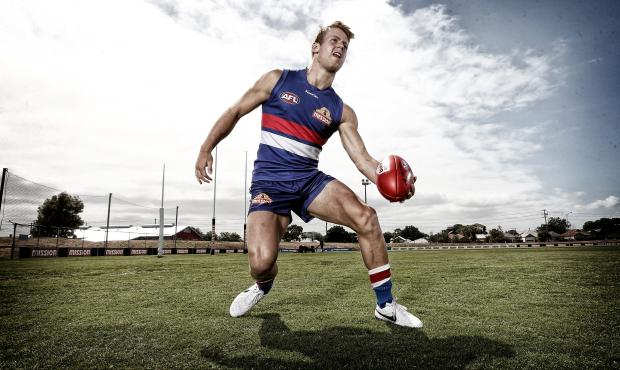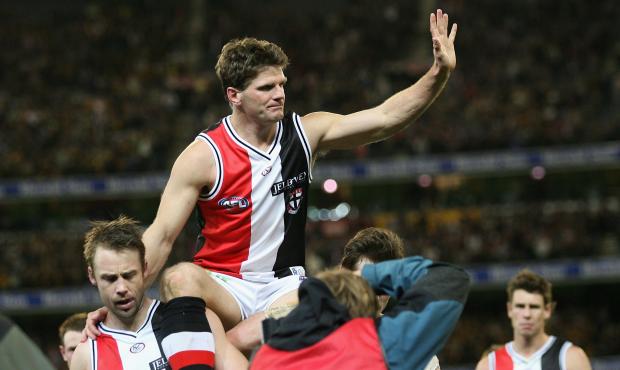That's because its pool of 100-game players who can qualify their offspring as potential father-son selections is relatively small.
While finding quality father-son selections is a matter of luck, the differing size in the pools of eligible fathers means some clubs have more tickets in the father-son raffle than others.
The fathers of most recent father-son selections - Luke McDonald, Joe Daniher, Jack Viney, Jed Bews, Tom Mitchell, Lachie Hunter, Mitch Wallis and Tom Liberatore - were all born between 1962 and 1966.
The Saints have just nine former players born in the 1960s who played 100 games, so they are unlikely to have a father-son selection soon.
Richmond is worse off, with just eight players born in the 1960s having played 100 games or more for the Tigers, but their pool of eligible fathers is set to increase.
For Victoria's 10 clubs, the average number of players born in the 1960s who played 100 games or more is 17.
The Sydney Swans and Brisbane Lions can also tap into Victorian football history, able to bid for players if their fathers appeared in at least 100 senior games with South Melbourne or Fitzroy respectively.
St Kilda's head of football Chris Pelchen told AFL.com.au the Saints were aware other clubs had a statistical advantage, but the benefits of the rule to the game far outweighed any potential disadvantage to any club.
"We should celebrate that AFL football is the only professional sport in the world that has a system operating in the form of our father-son program," he said.
"The opportunity for the sons of former players to wear the same guernsey as their fathers should be encouraged despite the idiosyncrasies that might sometimes be presented.
"After all, there is much more to be gained than lost in continuing a family's legacy at a particular club."
 St Kilda had just 13 100-game players born in the 1950s and 12 in the 1970s, well below the average – no wonder that since 1986 St Kilda has secured just two father-son selections.
St Kilda had just 13 100-game players born in the 1950s and 12 in the 1970s, well below the average – no wonder that since 1986 St Kilda has secured just two father-son selections.Stuart Annand did not play a game, while David Sierakowski played 93 games with the Saints, including the 1997 Grand Final, before heading to West Coast for 10 games.
As if to rub it in, the Saints lost the 2009 Grand Final to an opponent with four father-son selections – Ablett, Hawkins, Matthew Scarlett and Mark Blake. The highest draft pick the Cats used for them was No.38 for Blake.
If today's bidding rules had been in place it's likely Geelong would have had to use pick No.7 in the 2006 NAB AFL Draft to choose Hawkins, which would have made it impossible for the Cats to get both Joel Selwood, whom they chose at that spot, and Hawkins.
Pelchen said the bidding system advantaged teams whose father-sons were at the top end of the talent pool, but there was little way around it.
"We believe that the current bidding system is the fairest way to represent market value for father-son players, although there is often an even greater advantage afforded to clubs acquiring elite players via the first round of the draft than those players of lesser ability in later rounds," he said.
Essendon got Joe Daniher with pick No.10 when he was rated a top-three selection, while Melbourne used pick No.26 for Jack Viney when most experts rated him as top 10.
The Western Bulldogs had four father-son selections –Hunter, Wallis, Liberatore and Ayce Cordy – come from a pool of just 14 100-match players born in the 1960s. And they have Zaine Cordy to contemplate in the future.
The father-son eligibility rules mean a club's history – from a statistical basis if nothing else – can play a significant role in determining its future.
Not that St Kilda is complaining.
"A father-son system that represents equity across all clubs is going to be difficult to achieve because qualification of the players is distorted by a club's longevity in the competition," Pelchen said.
In round 18, 2012, the AFL Record sought information on the number of sons each club's former 100-game players have had.

It showed Adelaide had 19 former 100-gamers with at least one boy, while St Kilda listed only Robert Harvey, Stewart Loewe, Stephen Milne and Justin Peckett. It reflected the enormous role luck played.
Many clubs, including Adelaide, Carlton, Collingwood, Essendon, St Kilda and North Melbourne, have father-son academies or run father-son days to ensure they are aware of the potential talent coming through.
It is also a way to keep former players' families connected to the club in some manner.
This article focused on rules for Victorian-based clubs
West Coast can choose players if the father played 150 games, home and away or finals, before 1987 at Claremont, East Perth, West Perth or Subiaco. The Eagles have 57 former players born since the 1960s who played 100 games or more for the club.
Fremantle can choose players if the father played 150 games, home and away or finals, before but 1995 at South Fremantle, East Fremantle, Perth or Swan Districts. The Dockers have 31 former players born since the 1970s who played 100 games or more for the club.
Adelaide can choose players if the father played 200 games, home and away or finals, before 1991 at Norwood, Glenelg, Sturt or South Adelaide. The Crows have 40 former players born since the 1960s who played 100 games or more for the club.
Port Adelaide can choose players if the father played 200 games, home and away or finals, before 1997 at Port Magpies, Woodville-West Torrens, North Adelaide, Central District or West Adelaide. The Power have 33 former players born since the 1970s who played 100 games or more for the club.
The Sydney Swans can choose players if the father played 100 senior games, either home and away or finals, with South Melbourne or the Sydney Swans. The Swans have 63 former players born since the 1960s who played 100 games or more for those clubs.
The Brisbane Lions can choose players if the father played 100 senior games, either home and away or finals, with Fitzroy or the Brisbane Lions. The Lions have 51 former players born since the 1960s who played 100 games or more for those clubs.
Gold Coast and Greater Western Sydney will not have potential father-sons for decades until players who play 100 games have children old enough to be drafted.
Father-sons in frame this season:
Darcy Moore (son of Collingwood's Peter Moore who was born in 1959)
Josh Clayton (Fitzroy's Scott Clayton, 1959)
Zaine Cordy (Western Bulldogs' Brian Cordy, 1961)
Tyler Roos (Fitzroy's Paul Roos, 1963)
Billy Stretch (Melbourne's Steven Stretch, 1964)
Harry Dear (Hawthorn's Paul Dear, 1966)
100-game players from Victorian clubs born since 1950
Hawthorn 76, Essendon 72, Geelong 71, Collingwood 69, Melbourne 69, Carlton 68, Western Bulldogs 67, North Melbourne 66, Richmond 58, St Kilda 56
100-game players from non-Victorian clubs born since 1950
Sydney Swans 63, West Coast 57, Brisbane Lions 51, Adelaide 40, Port Adelaide 33, Fremantle 31, Gold Coast 0, GWS 0


